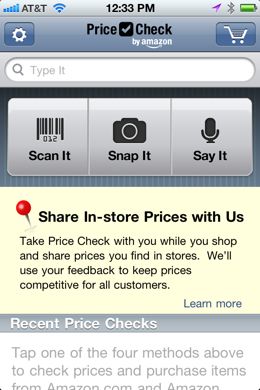 Amazon’s new PriceCheck app has retailers in a lather. Mind you, local retailers already hate Amazon, and for good reason. In a scenario you’ve likely heard, a customer walks in to a bookstore, enjoys excellent customer service, is guided to just the right book by the trained sales associate, and … well, you know the rest. (customer looks it up on Amazon, orders it on the spot. Or, even worse, orders the Kindle version over the free wi-fi). Meanwhile, the merchant is stuck holding Santa’s bag (pays rent, heat, light, payroll, local taxes, can’t scale long tail items due to local customer base …).
Amazon’s new PriceCheck app has retailers in a lather. Mind you, local retailers already hate Amazon, and for good reason. In a scenario you’ve likely heard, a customer walks in to a bookstore, enjoys excellent customer service, is guided to just the right book by the trained sales associate, and … well, you know the rest. (customer looks it up on Amazon, orders it on the spot. Or, even worse, orders the Kindle version over the free wi-fi). Meanwhile, the merchant is stuck holding Santa’s bag (pays rent, heat, light, payroll, local taxes, can’t scale long tail items due to local customer base …).
You can already scan items using Amazon’s excellent iOS app, but the PriceCheck app does one better. After you do your scan, you can act as part of Amazon’s drone army and send them the local price. Crowdsourced intel! To roll out the new app, on Dec. 10 Amazon offered consumers up to 5 percent back on purchases made through PriceCheck, igniting a firestorm of protest from local merchants.
So, is it inevitable that Amazon and other large online-only businesses take over the plurality of retail sales? The trend is here and will get stronger as we buy more with our mobile handsets. You can’t unring that bell.
But merchants can offer superior customer service or offer amenities that are unavailable online. In short, local retailers need to create and communicate value, not price, as their chief competitive advantage.
My local bookstore, Watermark Books, gets this message. There’s a nice cafe that draws people in. You can buy the New York Times. There are frequent events featuring popular authors. Every time I walk in, I find something new that I want to read. And they greet me by name. You may pay more (they do have sales), but they’ll gift wrap your purchase while you wait. The store brings value to my book shopping experience.
There is a something that government can do, however. Amazon has affiliates from every state, has a physical presence in 17 states, but only pays state sales tax in a handful of states. Retailers that sell nationally should pay sales tax. The current solution is a self-reported (and unenforceable) “use” tax. That’s right: you’re supposed to keep all your online receipts, add them up and tax yourself when you pay your income tax. Amazon and other online retailers have fought state efforts to collect state taxes and have mostly prevailed. Currently, the Marketplace Fairness Act, which would level the sales tax playing field, is working its way through the U.S. Senate. Sensing the inevitability of a uniform online tax, Amazon has offered to collect tax for affiliate merchants, beginning in 2012, for 2.9 percent of the value of the tax collected, in essence going from tax avoider to tax collector in one fell swoop.
Our government is broke, and avoiding paying tax seems to be the national sport. But in this case, we should all pay. Because it’s fair. And because not paying is killing our local merchants.
I like Amazon and am a customer. But I also support local merchants. Because I want to live in a town where there’s a local bookstore.
Read more about the Amazon PriceCheck app:
- Bloomberg Business Week: Amazon price check app is an attack on small business
- TechCrunch: Today Amazon will give you $15 to use PriceCheck and screw local retailers
- LA Times: Furor surrounds Amazon’s price comparison app
Novelist Richard Russo addressed this issue on the New York Times editorial page:
http://www.nytimes.com/2011/12/13/opinion/amazons-jungle-logic.html?_r=1
And this report from Mashable on the success of the campaign:
http://mashable.com/2011/12/13/amazon-price-check-app/